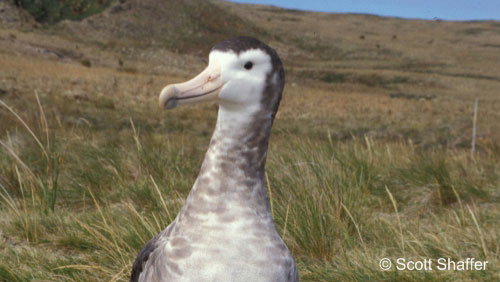Derek Rains of the Department of Biological Sciences, University of Lethbridge, Canada and colleagues have studied the genetic status of the small global population of the Critically Endangered Amsterdam Albatross Diomedea amsterdamensis, endemic to the French island of Amsterdam in the southern Indian Ocean, and have concluded that it is a good species. The abstract of their paper, published in January in the Journal of Avian Biology follows.

Abstract
"Wandering albatrosses have been subjected to numerous taxonomic revisions due to discoveries of new species, analyses of morphological data and, more recently, the inclusion of genetic data. The small population of albatrosses (170 individuals including 26 pairs breeding annually) on Amsterdam Island in the Indian Ocean, Diomedea amsterdamensis, has been given species status based on plumage and morphometrics, but genetic data published to date provide weak support and its specific status remains controversial for some authors. We used mitochondrial control region sequence data to elucidate the relationship of the Amsterdam albatross within the wandering albatross complex (Diomedea amsterdamensis, D. antipodensis, D. dabbenena and D. exulans). Three novel haplotypes were present in 35 individuals from Amsterdam Island, and were highly divergent (3.6-7.3%) from haplotypes found in the other three members of the wandering albatross complex. Low levels of genetic variation in Amsterdam albatross likely resulted, at least in part, from a population bottleneck. Geographic isolation in the wandering albatross complex is maintained by high natal philopatry. As Amsterdam Island is the only breeding ground for this critically endangered species, we strongly urge conservation efforts in the area, especially in relation to long line fisheries and other threats such as disease and introduced predators, and it be listed as a distinct species."
Reference:
Rains, D. Weimerskirch, H. & Burg, T.M. 2011. Piecing together the global population puzzle of wandering albatrosses: genetic analysis of the Amsterdam albatross Diomedea amsterdamensis. Journal of Avian Biology 42: 69-79.
Click here and here for news stories on this scientific publication.
John Cooper, ACAP Information Officer, 27 March 2011

 English
English  Français
Français  Español
Español